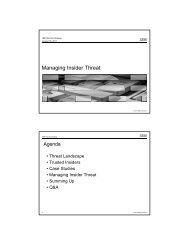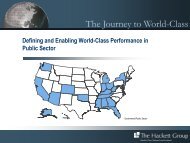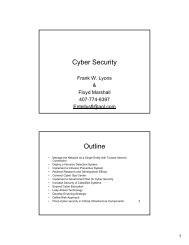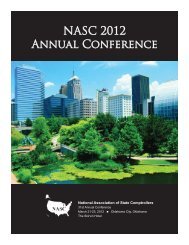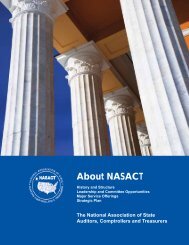Advisory Committee on Tax Exempt and Government Entities (ACT ...
Advisory Committee on Tax Exempt and Government Entities (ACT ...
Advisory Committee on Tax Exempt and Government Entities (ACT ...
Create successful ePaper yourself
Turn your PDF publications into a flip-book with our unique Google optimized e-Paper software.
The Appropriate Role Of The Internal Revenue Service With Respect To <strong>Tax</strong>-<strong>Exempt</strong> Organizati<strong>on</strong> Good Governance Issuesorganizati<strong>on</strong>s. 88 There also are innumerable situati<strong>on</strong>s where a tax-exemptorganizati<strong>on</strong>’s affiliati<strong>on</strong> with or membership in another organizati<strong>on</strong> requires orencourages the former organizati<strong>on</strong> to adopt specific governance <strong>and</strong> other measures.This can include, for example, organizati<strong>on</strong>s affiliated with a college or university,organizati<strong>on</strong>s affiliated with a religious order, <strong>and</strong> local branches of a nati<strong>on</strong>alorganizati<strong>on</strong> such as youth groups or health organizati<strong>on</strong>s focused <strong>on</strong> a specificdisease, am<strong>on</strong>g others.While this is a cursory review of the voluntary st<strong>and</strong>ards available to the thoughtfuln<strong>on</strong>profit, several points are worthy of note. First, many organizati<strong>on</strong>s have releasedpublicati<strong>on</strong>s <strong>on</strong> n<strong>on</strong>profit governance. Sec<strong>on</strong>d, these organizati<strong>on</strong>s often bringtremendous expertise to their analyses. 89 Third, while there are comm<strong>on</strong> themes, eventhese governance “experts” can disagree. 90 These differences suggest the advisability88See supra notes 12-17.89For example, in developing its set of 33 Principles, the Panel <strong>on</strong> the N<strong>on</strong>profit Sector c<strong>on</strong>vened 34 leaders from charities,foundati<strong>on</strong>s, academia <strong>and</strong> oversight agencies to form a special <str<strong>on</strong>g>Advisory</str<strong>on</strong>g> <str<strong>on</strong>g>Committee</str<strong>on</strong>g> <strong>on</strong> Self-Regulati<strong>on</strong>, commissi<strong>on</strong>ed two studiesof self-regulati<strong>on</strong> regimens already in use, <strong>and</strong> examined principles <strong>and</strong> st<strong>and</strong>ards drawn from more than 50 such systems,including selecti<strong>on</strong>s from the n<strong>on</strong>profit <strong>and</strong> for-profit sectors. In additi<strong>on</strong>, the first draft was circulated for public comment <strong>and</strong> furthermodified as a result. See Panel Principles, supra note 13, at 4. The BBB’s St<strong>and</strong>ards for Charity Accountability were developedwith “professi<strong>on</strong>al <strong>and</strong> technical assistance from representatives of small <strong>and</strong> large charitable organizati<strong>on</strong>s, the accountingprofessi<strong>on</strong>, grant making foundati<strong>on</strong>s, corporate c<strong>on</strong>tributi<strong>on</strong>s officers, regulatory agencies, research organizati<strong>on</strong>s <strong>and</strong> the BBBs.The BBB Wise Giving Alliance also commissi<strong>on</strong>ed significant independent research <strong>on</strong> d<strong>on</strong>or expectati<strong>on</strong>s to ensure that the viewsof the general public were reflected in the st<strong>and</strong>ards.” See supra note 81.90See, e.g., Adam Meyers<strong>on</strong>, We’re Not Signing It: Our C<strong>on</strong>cerns About Independent Sector’s “Principles for Good Governance <strong>and</strong>Ethical Practice,” Philanthropy Magazine (Dec. 17, 2007),http://www.philanthropyroundtable.org/article.asp?article=1510&paper=1&cat=1, in which the president of the PhilanthropyRoundtable explained why the organizati<strong>on</strong> would not be signing <strong>on</strong> to the Panel’s Principles. It “applauds Independent Sector <strong>and</strong>the Panel. . .for their tireless <strong>and</strong> well-organized work to improve n<strong>on</strong>profit governance, board financial oversight, fundraisingpractices, <strong>and</strong> compliance with the law” <strong>and</strong> found “most of the 33 principles” to be “quite sensible <strong>and</strong> offer a helpful guide for selfassessment”but then set forth its three reas<strong>on</strong>s for not recommending the document as a whole:First, a number of the Independent Sector principles take an arbitrary <strong>and</strong> <strong>on</strong>e-size-fits-all approach to setting st<strong>and</strong>ardsfor a very diverse sector.Sec<strong>on</strong>d, the Independent Sector principles imply improperly that foundati<strong>on</strong>s act unethically or practice misgovernanceunless their boards include members from diverse backgrounds.Third, while it is entirely appropriate for Independent Sector to put together st<strong>and</strong>ards of c<strong>on</strong>duct for its own members <strong>and</strong>for any<strong>on</strong>e else who wishes to adhere to them, it would be a mistake for the philanthropic community as a whole toendorse the entire document. Despite Independent Sector’s assurance that its principles represent “st<strong>and</strong>ards of practicethat organizati<strong>on</strong>s are encouraged, but not required to meet,” a number of the more problematic principles could bewritten into law [including by Senators Baucus <strong>and</strong> Grassley] or regulati<strong>on</strong> [including by the IRS] if it is perceived thatthere is a wide c<strong>on</strong>sensus behind them in the n<strong>on</strong>profit community.The president’s note provides as examples of principles that “unnecessarily restrict the ability of d<strong>on</strong>ors <strong>and</strong> trustees to use theirbest judgment in carrying out their charitable objectives” Principle 10, which suggests a minimum board size of five in mostsituati<strong>on</strong>s, <strong>and</strong> Principle 20, which includes a str<strong>on</strong>g presumpti<strong>on</strong> against compensating governing body members. With respect togoverning body size he argues: “Does any<strong>on</strong>e really think the Gates or Dell Foundati<strong>on</strong> would be more effective or better governedif they had six or seven board members instead of two or three? And if not, why is this <strong>on</strong>e-size-fits-all rule in there?” In c<strong>on</strong>necti<strong>on</strong>with compensati<strong>on</strong>, he points to the “l<strong>on</strong>g <strong>and</strong> venerable traditi<strong>on</strong>” of both volunteer board service, which is more comm<strong>on</strong>, <strong>and</strong>compensated board service, <strong>and</strong> opines that “philanthropic excellence” <strong>and</strong> “philanthropic mediocrity” are present in both, <strong>and</strong> that<strong>on</strong>e traditi<strong>on</strong> should not be favored over the other. He provides specific circumstances where a foundati<strong>on</strong> might legitimatelyc<strong>on</strong>sider paying board members situati<strong>on</strong>s.The president also c<strong>on</strong>tends that the Panel’s Principle 11, which speaks to boards including members with diverse backgrounds,including but not limited to ethnic, racial <strong>and</strong> gender, experience, <strong>and</strong> organizati<strong>on</strong>al <strong>and</strong> financial skills, misunderst<strong>and</strong>s diversity.He asserts: “The goal should not be to diversify each board--that’s a recipe for sector-wide homogeneity. The goal should be asufficiently vibrant sector with lots of different foundati<strong>on</strong>s representing lots of different interests, philosophies, <strong>and</strong> philanthropicstrategies.” With respect to philosophical outlooks <strong>and</strong> life experiences, he notes that a grantmaking organizati<strong>on</strong> may, in fact, avoidparalysis <strong>and</strong> “run best where there are comm<strong>on</strong> values <strong>and</strong> a shared sense of missi<strong>on</strong>” <strong>and</strong> “str<strong>on</strong>g mutual trust am<strong>on</strong>g boardmembers, so they can speak more freely with each other. . . .” In c<strong>on</strong>necti<strong>on</strong> with varying backgrounds <strong>and</strong> skills, he argues thatADVISORY COMMITTEE ON TAX EXEMPT AND GOVERNMENT ENTITIES (<strong>ACT</strong>) June 11, 2008 26






